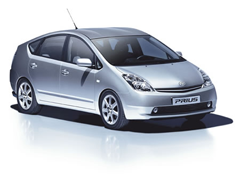
Humanity is threatened by a global-warming crisis. Canada, facing the crisis of global financial meltdown, is looking for ways to keep people working. The time is ripe, it seems, for an era of massive, green public-works projects.
Projects like a 12-kilometre SkyTrain subway line connecting Vancouver to the University of British Columbia.
Imagine that train packed with smiling, eco-guilt-free students zipping on and off their secluded campus by the sea. The UBC subway line, which would run through the heart of the city, is already on the drawing board, slated for 2020. Provincial and Vancouver political leaders have voiced their enthusiasm. The price tag is set at $2.8 billion.
Well, hold on there. Patrick Condon, senior researcher at the Design Centre for Sustainability at UBC, has run further numbers and believes he has a more sensible plan.
Instead of building that train, you could give every new UBC undergrad the keys to their very own Prius automobile. Year after year. Forever.
That's right. As Condon calculates in a new study, you'd start by putting the $2.8-billion price of the train into a trust that earns six per cent interest. That would generate $168 million a year -- about enough to give every full-time undergrad entering UBC a basic $25,000 hybrid vehicle. (No leather seats -- we're in crisis mode, you know.) Now wouldn't the planet -- not to mention UBC's recruitment officers -- like that approach more than just one measly new subway line?
In praise of the tram
If your head is whirling, Patrick Condon has achieved his aim.
"We as a society are trying to stave off dual crises of environmental collapse and economic collapse," Condon says. "That means our cities have to run a lot more efficiently. In fact, we need a new order of economic and energy efficiency in order to compete and stay alive. If we blow the big decisions in the next handful of years, we will seriously cripple our ability to adapt. We have to get it right."
Actually, for Condon, getting transit right does not mean giving away Prius vehicles to 18-year-olds.
Nor, however, does it mean further funding the Cadillac of public transit, Vancouver's SkyTrain.
Condon strongly advocates a third approach -- street-level trams on rails -- as the most eco-friendly and cost-efficient way to move people within urbanized regions, such as Vancouver.
He comes to that conclusion in his study "A Cost Comparison of Transportation Modes," co-authored with Kari Dow, a master's student in landscape architecture at UBC. The modes compared include the modern tram (rail vehicles operating on existing right-of-ways); light rail transit (operating on separate right-of-ways); the heavier, automated SkyTrain (a mostly elevated rapid-rail transit system); the electric trolley bus; longer and shorter diesel buses; the Prius hybrid car; and the Ford Explorer SUV.
When Condon and Dow measured each for economic and environmental efficiency, they produced some surprising comparisons.
For energy use and cost per passenger mile, the tram and LRT bested the rest. Put four people in a Prius, though, and it's only a bit worse than a loaded diesel bus.
Carbon output? The tram, trolley bus, SkyTrain and LRT all run on electricity, so their outputs were vastly lower than the diesel buses and autos, especially given B.C.'s hydro power.
But here's the zinger: Add up all costs for each form of transportation -- capital, operating and energy -- and guess which is most expensive per passenger mile? SkyTrain -- even more than the gas-hogging SUV and nearly twice the winner, which is -- you guessed it -- the tram.
Rethink the need for speed
In a previous study, Condon's team created a map showing that for the same cost, you could have the single UBC subway line or dozens of tram lines running all over the region. They noted that in Portland, Oregon, trams have enlivened neighbourhoods, bringing a rise in property values.
So why would super-efficient trams still be a hard sell? Speed. SkyTrain will whisk you across town, or across the region, nearly twice as fast as the tram.
But Condon says we're missing the point. As dual crises force us to adapt, we'll have to let go of something. Let it be our dream of effortless speed. The Space Age is passé. Take it easy and learn to enjoy the practical, if pokey, ride. Value connectedness, democracy, the way that trams, by costing less, can place public transit within walking distance of far more people. Instead of building bullet trains, use land intelligently, "so people already are close to where they want to go."
Condon's study starts a needed conversation as leaders rush to promise change, big and green, in scary times. U.S. president-elect Barack Obama's massive stimulus package could produce myriad smart, appropriate fixes.
Or if wrong, it truly could be the last great American boondoggle.
Here in Canada, we need people, like Patrick Condon, who prod us to think more deeply about how best to seize the opportunities that crises provide.
Related Tyee stories:
- SkyTrain Billions Better Spent on Trams: Study
Money for single UBC subway line could pay for region laced by light rail. - SkyTrain's Mounting Death Toll
Experts urge platform barriers already saving lives in other cities. - No Fares! (A Tyee fellowship series)
Time for a free ride on public transit.
Read more: Transportation, Environment
















Tyee Commenting Guidelines
Comments that violate guidelines risk being deleted, and violations may result in a temporary or permanent user ban. Maintain the spirit of good conversation to stay in the discussion.
*Please note The Tyee is not a forum for spreading misinformation about COVID-19, denying its existence or minimizing its risk to public health.
Do:
Do not: